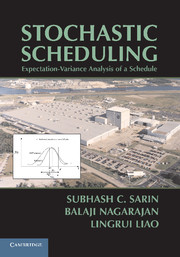Book contents
- Frontmatter
- Contents
- Foreword
- Preface
- STOCHASTIC SCHEDULING
- 1 Introduction
- 2 Robust Scheduling Approaches to Hedge against Processing Time Uncertainty
- 3 Expectation-Variance Analysis in Stochastic Multiobjective Scheduling
- 4 Single-Machine Models
- 5 Flow-Shop Models
- 6 Job-Shop Models
- 7 Parallel-Machine Models
- 8 The Case of General Processing Time Distribution
- 9 Concluding Remarks
- Appendix
- Bibliography
- Index
8 - The Case of General Processing Time Distribution
Published online by Cambridge University Press: 05 July 2014
- Frontmatter
- Contents
- Foreword
- Preface
- STOCHASTIC SCHEDULING
- 1 Introduction
- 2 Robust Scheduling Approaches to Hedge against Processing Time Uncertainty
- 3 Expectation-Variance Analysis in Stochastic Multiobjective Scheduling
- 4 Single-Machine Models
- 5 Flow-Shop Models
- 6 Job-Shop Models
- 7 Parallel-Machine Models
- 8 The Case of General Processing Time Distribution
- 9 Concluding Remarks
- Appendix
- Bibliography
- Index
Summary
Introduction
In Chapters 4 through 7 we have developed expressions of expectation and variance for various performance measures of a given schedule of jobs. We have considered schedules for different machine configurations. For some of the performance measures of these schedules, necessary assumptions are made on the type of processing time distribution used to enable development of analytical expressions. Table 8.1 gives an overview of the machine configurations and performance measures that we have considered, and it also depicts the assumptions made on the processing time distributions used for each of these cases. This table also presents information on the level of accuracy of the resulting expressions for the expectation and variance of a performance measure and whether the analysis relies on Clark's method (Clark, 1961).
Clark's method for approximating the expectation and variance of the maximum of a set of random variables is based on the assumption of normal distributions for all random variables. In this chapter we relax this assumption and consider the case of general processing time distributions. Our analysis relies on the use of finite-mixture models.
Finite-Mixture Models
The use of a finite mixture of distributions provides a flexible methodology to represent a variety of random phenomena.
- Type
- Chapter
- Information
- Stochastic SchedulingExpectation-Variance Analysis of a Schedule, pp. 94 - 152Publisher: Cambridge University PressPrint publication year: 2010



